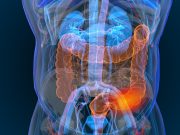Tag: Cancer: Rectal
Recent Decline in Risk for CRC Recurrence Seen in Stage I to III Disease
Patients with stage III disease had a shorter time from surgery to recurrence than those with stage I disease
>10 Percent of FIT Are Unsatisfactory and Cannot Be Processed
Fewer than half of those with an unsatisfactory FIT completed a subsequent test within 15 months
Type 2 Diabetes Linked to Increased Risk for Colorectal Cancer
Greater associations seen for those without colonoscopy screening, with smoking history, and for recent diabetes diagnosis
Receipt of Guideline-Concordant Care Lower for Black Colorectal Cancer Patients
Disparity explained by health insurance among those with colon and rectal cancer
Advanced Neoplasia Risk Increased at Upper Range of Negative FIT Values
At fecal hemoglobin cutoff of 17 µg/g, sensitivity and PPV were 39 percent and specificity and NPV were 93 percent
Risk-Adapted Starting Age of CRC Screening Varies by Sex, Genetics
Risk-adapted starting age of screening varies by 24 years for men in highest polygenic risk score decile versus women in lowest
ACG: Noninvasive Multitarget Stool RNA Test Has High Sensitivity for CRC
mt-sRNA has sensitivity of 94 percent for detecting colorectal cancer, 46 percent for advanced adenomas
Sotorasib + Panitumumab Beneficial for Chemorefractory Metastatic CRC
Reduced hazard ratio seen for disease progression or death with sotorasib-panitumumab versus standard care
CRC Screening Uptake No Better With Use of FIT in At-Risk Individuals
FIT screening does not improve screening uptake and has lower rate of advanced colorectal neoplasia detection
Diabetes Severity Tied to Outcome in CRC Patients Undergoing Resection
Worse overall, disease-free, cancer-specific survival seen for patients with diabetes with complications














